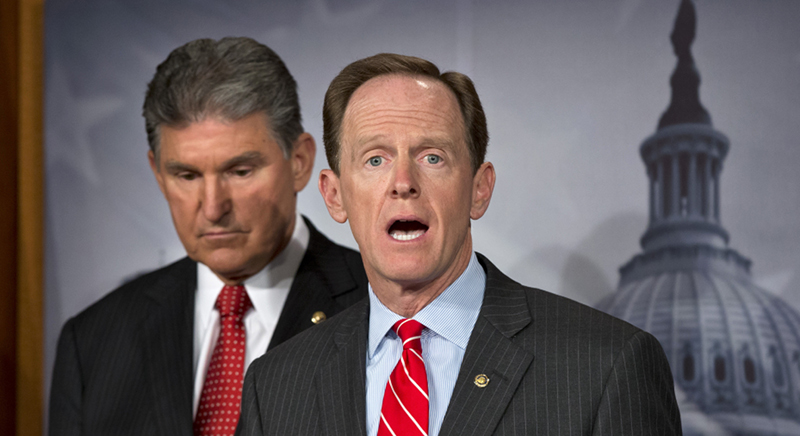The final text of the agreement reached by Sens. Joe Manchin (D-WV) and Pat Toomey (R-PA) to expand background checks was released late last week, clarifying its modest steps to close some loopholes in existing federal gun laws, while protecting or expanding others.
By and large, gun control supporters see it as a positive step that would make it harder for dangerous people to obtain firearms. But although it closes some gaps, they lament that the price of passing any legislation in Congress requires leaving others open.
“This is not a universal background check bill,” said Josh Horwitz, executive director of the Coalition to Stop Gun Violence. “But we do think this is a step in the right direction.”
The Gaps It Closes
The legislation closes the so-called gun show loophole by requiring an FBI background check for all firearm sales conducted at a gun show. It requires a criminal check for all commercial gun transactions, including listings posted in a newspaper or on the Internet. It expands an existing law that only requires background checks for licensed dealers, letting unlicensed dealers sell firearms without background checks in accordance with state and local laws.
Gun control supporters are also pleased that the bill ensures record-keeping by the seller on transactions, akin to those already required on background checks that are mandatory. The dealer would need to keep a record of the sales he or she conducts in the event that police need to trace a weapon used to commit a crime.
“I think it does cover a lot of new additional sales and that’s important,” said Horwitz. “The good part about this bill is it has a really strong record-keeping requirement. It extends the requirements in current law for background checks, which we thought was really important.”
The Manchin-Toomey bill gives the FBI 48 hours to block a transaction at a gun show due to a red flag in a buyer’s background, with the aim of reducing that to 24 hours in four years. Current law gives the FBI 72 hours to block a sale from a licensed dealer. If the sale goes through, the FBI would have 24 hours to destroy the data on the buyer. Contrary to a popular myth from pro-gun activists, the bill would in no way create a national gun registry.
The Gaps It Leaves Open
The crucial exemption that worries gun control supporters is that background checks would not be required for private, non-commercial sales or transfers between family and friends. In other words, if two people meet and one decides to sell his gun to the other, he can do so without a background check as long as the sale wasn’t initially advertised.
“The bill covers only purchasers who buy at a gun show or via some kind of advertised sale,” said Jim Jacobs, a law professor and gun control expert at New York University. “It doesn’t require every secondary purchaser to be background checked.”
That same exemption weakens the gun show requirement. A buyer and seller who meet at a gun show can potentially — and legally — make the transaction afterward outside the event without a background check.
“There’s nothing in the law that prevents someone from going to a gun show, finding the gun he likes, then meeting the seller off-site to complete the sale without a background check,” said Adam Winkler, a law professor at UCLA and gun law expert.
“You can simply go to the McDonalds or Starbucks across the street and make the transaction,” said Horwitz.
The Manchin-Toomey legislation beefs up gun rights in other areas. It seeks to make it easier for gun dealers to advertise and sell their firearms across state lines, and protects sellers from lawsuits if the buyer passes a background check but later uses the gun in a crime. And to quell right-wing concerns, the bill includes a penalty of 15 years in prison for any federal officer who seeks to use data to create a gun registry.






